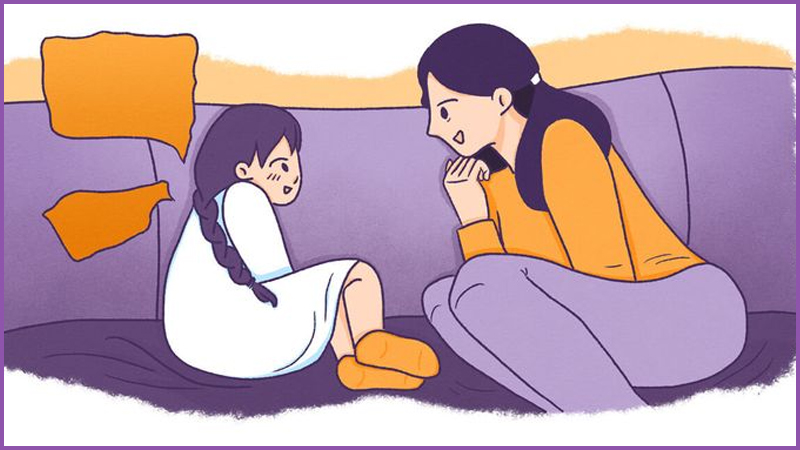Every child, from birth, is enveloped in the love and protection of their parents. Consequently, their parenting style significantly impacts their child’s development, behavior, and growth. However, each family has a unique approach to parenting, ranging from strict to lenient.
Diana Baumrind, a renowned American psychologist and child development expert, conducted a study involving observations and interviews with the parents of 100 kindergarteners. She identified four common parenting styles.
1 Authoritarian Parenting
This style adheres to the principle of “parents are always right.” Children are expected to obey without question and face strict discipline if they deviate.

Benefits: Authoritarian parenting produces obedient, respectful children who are unafraid to speak their minds. They tend to be strong-willed and direct in addressing issues.
Drawbacks: This style can negatively impact children in several ways:
Difficulty maintaining a healthy relationship as they mature: This approach is only effective during childhood. As they age, they may defy parental rules or lie to do as they please.
Inhibits self-discipline and assertiveness development: Children are not allowed to make their own decisions, even on minor matters.
Adverse effects on mental health and psychology: When children make mistakes, they face severe punishment, leading to anxiety and fear of losing their parents’ love. Prolonged exposure to this environment can result in mental health issues.
Risk of rebellious behavior: As they mature and gain independence, children may break the rules set by their parents, potentially leading to risky behaviors once they are free from parental control.
Potential for strained or severed relationships: Children may distance themselves from their parents once they break free from familial constraints.
2 Authoritative Parenting
Similar to the authoritarian style, authoritative parenting is more flexible. While parents maintain high expectations, they are also responsive to their children’s behaviors and allow them to make decisions within reasonable boundaries. Rules are imposed based on the child’s capabilities and age.

Benefits:
Encourages independence and self-regulation: Children are allowed to be themselves and develop self-sufficiency, self-control, and the ability to adapt their behavior to different situations.
Promotes positive mental health: Children feel loved and secure, leading to improved behavior, obedience, and a more relaxed attitude.
Fosters responsibility and social awareness: As they mature, children learn to make decisions, take responsibility for their actions, and cooperate with others. They also develop assertiveness and a sense of social responsibility.
Encourages open communication: Children are free to express their opinions, thoughts, and desires.
Drawbacks:
Limited autonomy: While children can express their opinions and make some decisions, the final say rests with the parents.
Strict rules remain in place: Although rules are explained, children must still abide by them.
3 Permissive Parenting
In this style, parents focus more on their children’s needs than on discipline. They provide a loving, nurturing environment with minimal demands and low expectations for maturity and self-reliance. Consequently, punishment is rare.

Benefits:
Positive mental health: Children feel loved and indulged, free from fear or anxiety when they make mistakes.
Freedom to explore: Children are allowed to engage in activities beyond their age or ability level.
Drawbacks:
Lack of moral compass: Children struggle to distinguish between right and wrong.
Entitlement and demanding behavior: As they interact with peers, children may demand that their parents provide material possessions similar to those of their friends.
Impulsivity and defiance: Permissive parenting can result in children who are impulsive, disobedient, and rebellious. They may also struggle with persistence, leading to poor academic performance and limited success.
4 Uninvolved Parenting
This style is similar to permissive parenting but lacks the element of parental warmth. Parents provide for their children’s basic needs but show little interest in their lives. They may even delegate child-rearing responsibilities to nannies or grandparents.

Benefits: Children enjoy freedom and autonomy, making decisions according to their desires.
Drawbacks:
Lack of emotional connection and support: Children’s opinions are often ignored, and they don’t receive the warmth and attention they need from their parents.
Inability to distinguish right from wrong: Children struggle to develop a moral compass.
Neglected needs: Children’s requests are often denied or ignored.
Lack of self-control: Children struggle to regulate their emotions and behaviors.
Poor academic performance and social issues: Uninvolved parenting can lead to depression, social withdrawal, and poor academic performance. It may also increase the risk of children engaging in delinquent behavior and falling prey to negative social influences.
While each of these parenting styles has its advocates, authoritative parenting stands out as the most effective approach. Authoritative parents are fair and reasonable, explaining the rules they set. This encourages children to think critically about the rules and learn from their own experiences. Additionally, this style balances warmth and discipline, ensuring that children feel loved and supported while learning to make their own decisions.
It’s important for parents to present a united front to avoid confusing their children. When both parents have different approaches, children may gravitate towards the more lenient parent, undermining the effectiveness of the authoritative style.
Discover the Slow Parenting Method for Holistic Child Development
Discover the slow parenting approach that promotes comprehensive child development. This article provides detailed and useful information to help you care for your child in the best possible way.

























 Development
Development








